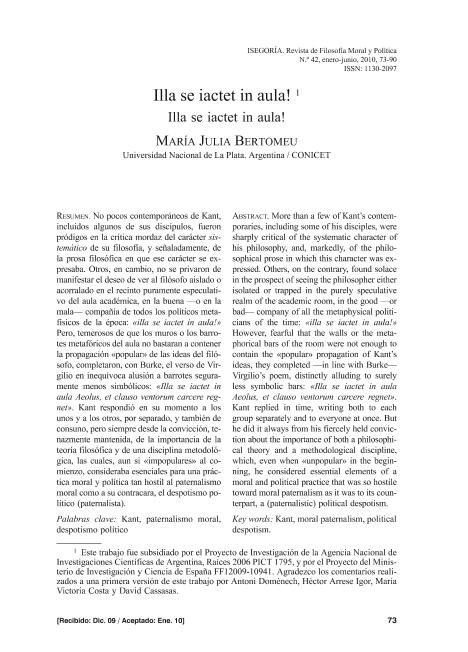Mostrar el registro sencillo del ítem
dc.contributor.author
Bertomeu, Maria Julia

dc.date.available
2023-02-02T12:06:59Z
dc.date.issued
2010-03
dc.identifier.citation
Bertomeu, Maria Julia; Illa se iactet in aula! Illa se iactet in aula!; Consejo Superior de Investigaciones Científicas. Instituto de Filosofía; Isegoría; 42; 3-2010; 73-90
dc.identifier.issn
1130-2097
dc.identifier.uri
http://hdl.handle.net/11336/186588
dc.description.abstract
No pocos contemporáneos de Kant, incluidos algunos de sus discípulos, fueron pródigos en la crítica mordaz del carácter sistemático de su filosofía, y señaladamente, de la prosa filosófica en que ese carácter se expresaba. Otros, en cambio, no se privaron de manifestar el deseo de ver al filósofo aislado o acorralado en el recinto puramente especulativo del aula académica, en la buena —o en la mala— compañía de todos los políticos metafísicos de la época: «illa se iactet in aula!» Pero, temerosos de que los muros o los barrotes metafóricos del aula no bastaran a contener la propagación «popular» de las ideas del filósofo, completaron, con Burke, el verso de Virgilio en inequívoca alusión a barrotes seguramente menos simbólicos: «Illa se iactet in aula Aeolus, et clauso ventorum carcere regnet». Kant respondió en su momento a los unos y a los otros, por separado, y también de consuno, pero siempre desde la convicción, tenazmente mantenida, de la importancia de la teoría filosófica y de una disciplina metodológica, las cuales, aun si «impopulares» al comienzo, consideraba esenciales para una práctica moral y política tan hostil al paternalismo moral como a su contracara, el despotismo político (paternalista).
dc.description.abstract
More than a few of Kant's contemporaries, including some of his disciples, were sharply critical of the systematic character of his philosophy, and, markedly, of the philosophical prose in which this character was expressed. Others, on the contrary, found solace in the prospect of seeing the philosopher either isolated or trapped in the purely speculative realm of the academic room, in the good - or bad - company of all the metaphysical politicians of the time: «illa se iactet in aula!» However, fearful that the walls or the metaphorical bars of the room were not enough to contain the «popular» propagation of Kant's ideas, they completed - in line with Burke - Virgilio's poem, distinctly alluding to surely less symbolic bars: «Illa se iactet in aula Aeolus, et clauso ventorum carcere regnet». Kant replied in time, writing both to each group separately and to everyone at once. But he did it always from his fiercely held conviction about the importance of both a philosophical theory and a methodological discipline, which, even when «unpopular» in the beginning, he considered essential elements of a moral and political practice that was so hostile toward moral paternalism as it was to its counterpart, a (paternalistic) political despotism.
dc.format
application/pdf
dc.language.iso
spa
dc.publisher
Consejo Superior de Investigaciones Científicas. Instituto de Filosofía
dc.rights
info:eu-repo/semantics/openAccess
dc.rights.uri
https://creativecommons.org/licenses/by/2.5/ar/
dc.subject
Kant
dc.subject
Paternalismo moral
dc.subject
Despotismo Político
dc.subject.classification
Ética

dc.subject.classification
Filosofía, Ética y Religión

dc.subject.classification
HUMANIDADES

dc.title
Illa se iactet in aula! Illa se iactet in aula!
dc.type
info:eu-repo/semantics/article
dc.type
info:ar-repo/semantics/artículo
dc.type
info:eu-repo/semantics/publishedVersion
dc.date.updated
2023-01-31T17:38:27Z
dc.identifier.eissn
1988-8376
dc.journal.number
42
dc.journal.pagination
73-90
dc.journal.pais
España

dc.journal.ciudad
Madrid
dc.description.fil
Fil: Bertomeu, Maria Julia. Consejo Nacional de Investigaciones Científicas y Técnicas; Argentina. Universidad Nacional de La Plata; Argentina
dc.journal.title
Isegoría
dc.relation.alternativeid
info:eu-repo/semantics/altIdentifier/url/https://isegoria.revistas.csic.es/index.php/isegoria/article/view/684
dc.relation.alternativeid
info:eu-repo/semantics/altIdentifier/doi/https://doi.org/10.3989/isegoria.2010.i42.684
dc.relation.alternativeid
info:eu-repo/semantics/altIdentifier/url/https://dialnet.unirioja.es/servlet/articulo?codigo=3308824
Archivos asociados
